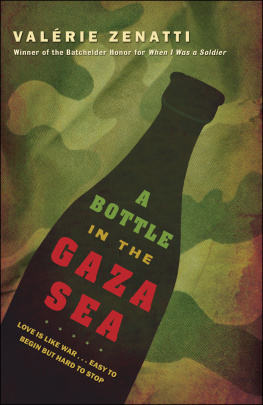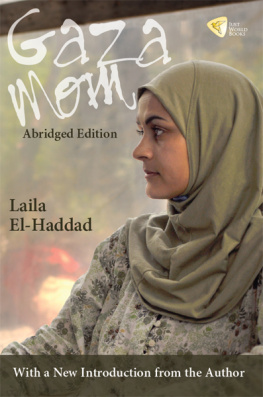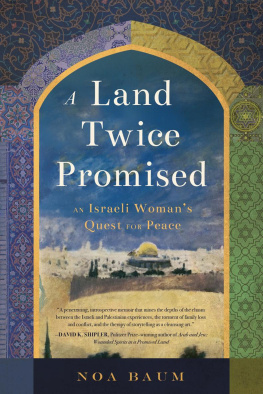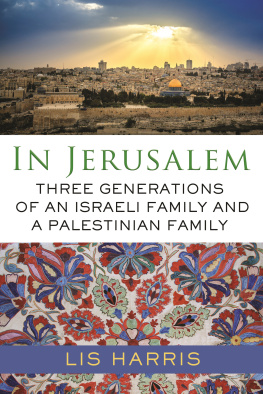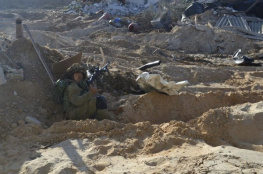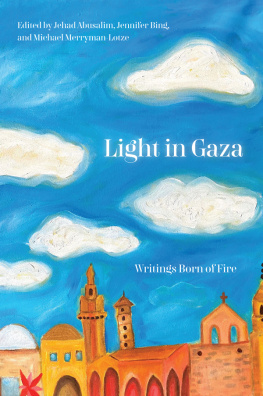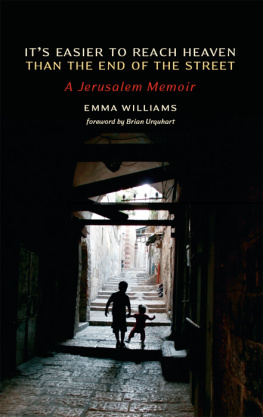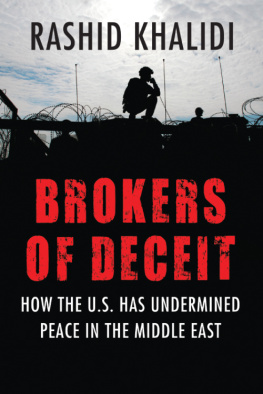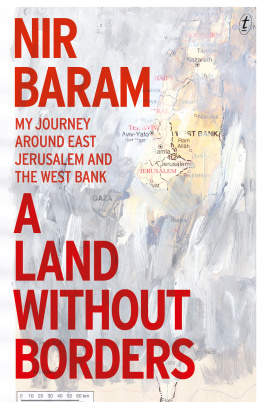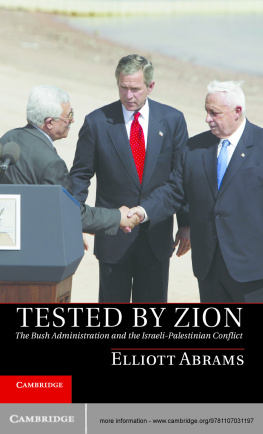When I Was a Soldier
A Bottle in the Gaza Sea

Copyright 2005 by Valrie Zenatti
English translation copyright 2008 by Adriana Hunter
Originally published in France by L'Ecole des Loisirs in 2005 as Une Bouteilledans la Mer de Gaza
All rights reserved.
You may not copy, distribute, transmit, reproduce, or otherwise make available this publication (or any part of it) in any form, or by any means (including without limitation electronic, digital, optical, mechanical, photocopying, printing, recording, or otherwise), without the prior written permission of the publisher. Any person who does any unauthorized act in relation to this publication may be liable to criminal prosecution and civil claims for damages.
Published by Bloomsbury U.S.A. Children's Books, 175 Fifth Avenue, New York, New York 10010
Distributed to the trade by Macmillan
LIBRARY OF CONGRESS CATALOGING-IN-PUBLICATION DATA
Zenatti, Valrie.
[Bouteille dans la Mer de Gaza. English]
A bottle in the Gaza Sea / by Valerie Zenatti; translated by Adriana Hunter.
1st U.S. ed.
p. cm.
Summary: Seventeen-year-old Tal Levine of Jerusalem, despondent over the ongoing Arab-Israeli conflict, puts her hopes for peace in a bottle and asks her brother, a military nurse in the Gaza Strip, to toss it into the sea, leading ultimately to friendship and understanding between her and an "enemy."
eISBN: 978-1-59990-505-1
1. Arab-Israeli conflictJuvenile fiction
[1. Arab-Israeli conflictFiction. 2. TolerationFiction. 3. LettersFiction. 4. IsraelFiction. 5. Gaza StripFiction.]
I. Hunter, Adriana. II. Title.
PZ7.Z425Bot 2008 [Fic]dc22 2007042361
First U.S. Edition 2008
E-book edition published in 2013
www.bloomsbury.com
For the luminous Sophie and Jrme
Ce n'est pas parce que les uns ont raison que
les autres ont tort. Il faut garder les rves intacts.
Les rves, c'est ce qui nous fait avancer.
It is not because some people are right that others
are wrong. All of our dreams must remain intact. Our
dreams keep us moving forward.
Contents
It's a time of darkness, sadness, and horror. The fear's back again.
Mom had just told me to go to bed for the third time (because I have to get up early in the mornings) when the windows started rattling. My heart gave a great thump inside my chest; I thought it had come halfway up my throat. A second later I realized there had been an explosion really close to our house.
An explosion must mean a bomb.
My older brother, Eytan, who's a military nurse, ran straight out with his first aid kit. Dad hesitated for a moment, then followed him. Mom held me in her arms and cried; then, as usual, she did four things at once: she turned on the TV and the radio, connected to the Internet, and grabbed her cell phone. That's what I call a highly technological response.
I ran to my bedroom, confident that no one would nag me to switch off my light and that the next day I could even get to school late, or not go at all. Nobody would ask for an explanation. I would just have to say the bomb was in my neighborhood, in my street, I had nightmares all night, my blood pressure soared, I couldn't walk, I was too frightened to leave the house. And Mrs. Barzilai would believe me, even if we had a math test.
A few minutes after the explosion we heard the ambulance sirenssuch a horrible noise, ripping through the air and our eardrums. A terrible yowling like a cat with its tail caught in a door, amplified by a sound system worthy of a hard rock concert. Five, six, seven ambulances, but I didn't count them all.
I can hear Mom still on the phone, and the clear staccato voice of some woman correspondent on the radio or the TV. There will have been some deaths. There are almost always deaths. But I don't want to know how many, or who. Not today. Precisely because it happened so close to home.
I'd like to turn the silence right up, but how do you do that?
I went into the kitchen to drink a bit of vodka and lemon. Mom didn't see me. On my way I picked up the earplugs Dad uses when he goes swimming. With those plus my big pillow over my head I might have some hope of sleeping, even if I know that when I wake up tomorrow no one will tell me that everything's fine and it's all been a bad dream.
The vodka didn't go down very well. Half a glass is obviously too much for me. This morning I had a headache and my face was all swollen. "You look like Bugs Bunny," Eytan told me, ruffling my hair. My brother's the only person in the world who can mess up my hair without being walloped within a second. He knows that and makes the most of it.
He smiled at me. He didn't look like someone who'd spent the night witnessing horror, but then what do you look like when you've witnessed horror? He's twenty years old and doing military service in Gaza; I'm sure he sees terrible things there every day... or every other day, when it's quiet. I expect he'd have to learn to not see, or at least to forget, if he wants to avoid looking old before he's twenty-five.
It's strange, I don't think I've ever written as much as I have between yesterday and today. There are some girls in my class who keep diaries and write down what happens to them every day. I've never done thatdissected my love life, or said how old and useless my parents are, or divulged my dreams. Well, I imagine that's what you put in a diary.
On my thirteenth birthday my grandmother gave me TheDiary of Anne Frank, the story of the young Jewish girl in the Netherlands who spent two years of her life hiding with her family during the Second World War before being deported. She dreamed of being a writer, but more important, of freedom: to go to the cinema, to walk in a garden, to look at the trees and listen to the birds without fear of being caught and killed by the Nazis. There was another family in the hiding place with a son named Peter, and Anne fell in love with him. I've often wondered whether she really loved him or whether she didn't have any choice because he was the only boy there.
What upset me most was the end of the book where it said: Anne Frank died two months before the camp at Bergen-Belsen was liberated.
Just two months... I read that sentence again and again, and for a long time I wished I could reach out, take Anne Frank's hand, and say, "Hang on, this hell is nearly over, it won't go on forever, just eight little weeks. Hang on and you'll be free, you'll be able to go to the cinema, to look at the trees and listen to the birds; you could even be a writer. Please, live!"
But I don't have superpowers or a time machine, and that's what's so heartbreaking when you think about it.
I still don't know why I'm writing all this. I get average grades for literature, nothing more, and I have no dreams of being a writer. What I really want is to make films, to be a director. Or perhaps a pediatrician, I haven't really chosen yet. But, since yesterday evening, I've got this incredible urge to write; it's all I can think about. As if there's a river of words bursting to come out of me to keep me alive. I feel as if I'll never be able to stop.
I haven't managed to avoid the news. My eyes see, my ears hear, there are newspapers and radios everywhere, and they keep talking about the bomb attack.
The terrorist blew himself up inside the Hillel cafe. They found six bodies. It's what they call an average attack, which means it will be talked about for a couple of days and then there will be a bit more in the Sunday supplements. There was a tragedy, a tragedy within the tragedy: a young woman was killed with her father. She was due to be married today. She was killed a few hours before putting on her beautiful white dress, a few hours before the photographer took the young couple to the loveliest places in Jerusalem to take pictures of the prince and princess who would have lots of children. The groom-who-never-got-married was devastated by the sight of her coffin. He wanted to put the wedding ring on his fiancee's finger but the rabbi refused, saying religious law forbade celebrating a union with a dead person.

